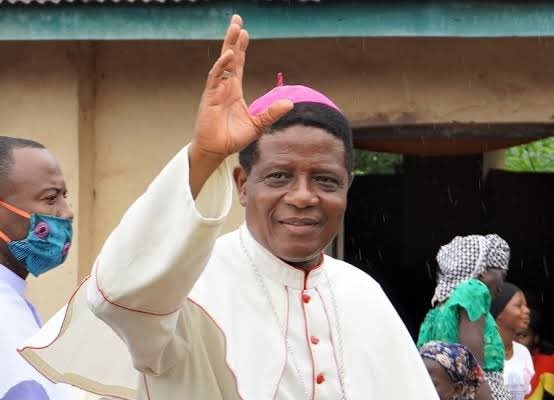By Osmund Agbo
“Every man ought to be above his position in the sense of being more than his position. To be king and nothing more, judge and nothing more, tallow-handler and nothing more, is to allow the accident to swallow up the essence and prove a miserable failure when measured by the true standard of human worth.” – Henry James Slack (1818–1896), The Philosophy of Progress in Human Affairs
A few months ago, a great friend of mine sent me a video. Since Musa and I started debating Peter Obi and his Labour Party’s prospects in the 2023 presidential election, it has become customary for him to inundate my news feeds with such bothersome clips unearthed from the depths of opposition researchers’ archives. I was on the verge of hitting the delete button when I noticed a figure adorned in pontifical vestments. Intrigued, I pressed the play button, and there before me appeared the youthful face of my local bishop as he delivered a sermon, not only in Igbo but precisely in my Nsukka local dialect.
Bishop Onah grew up in my neck of the woods and played in the sand with my older siblings. Everyone who comes across him does not fail to notice a man with uncommon intellect. His pastoral style tends to emphasise the whole man, who not only fulfills his spiritual obligations here on earth but also sees himself as the light that illuminates the path for all people, in order to provide the transformational leadership the world so desperately needs. His relational and rational approach to issues is a testament to his understanding of the philosophical underpinnings.
At first, I wondered why Musa, who doesn’t understand basic Igbo, let alone my local dialect, would share such a video with me. However, as the bishop’s words resonated through the screen, I realised the power of his oratory and the universal appeal of his message. Bishop Onah’s sermon was not a political stump speech but a clarion call for social justice; it was a thoughtful cautionary note to politicians who might undermine the youth movement leading up to the 2023 election.
In the realm of intellectual and spiritual leadership, there are individuals who transcend their positions to become guiding lights for humanity. Bishop Godfrey Igwebuike Onah is one such exceptional figure—a true philosopher-king. In playing this role, he has found himself in the eye of the storm several times, facing great personal risk; a profile in extraordinary courage. Curiosity piqued, Musa and I spent the rest of the evening delving deeper into the internet, replaying the video multiple times and uncovering more of his old speeches.
Ordained as a Catholic priest in 1984, he later served as a Professor of Philosophical Anthropology in Rome and held esteemed positions such as Deputy Vice-Chancellor of the Pontifical Urbaniana University and Consultor to the Secretariat of the Synod of Bishops at the Vatican City. Beyond the pulpit, Bishop Onah continues to contribute his vast knowledge and experiences as the Chairman of the Governing Councils and Pro-Chancellor of two Nigerian universities.
In Nigeria, there are few priests cut in the mould of Bishop Onah, combining their ecclesiastical calling with a passion for championing the cause of the oppressed. One notable figure is Bishop Mathew Hassan Kukah of the Sokoto Catholic diocese, who stands tall as a champion of good governance. His remarkable efforts to redefine Nigerian politics and promote responsive governance are reflected through his establishment of the Kukah Center, a policy research institute in Abuja.
Another individual worthy of mention is Father George Ehusani, an esteemed moral voice and dedicated advocate for equity. Serving as the executive director of the Lux Terra Leadership Foundation, he tirelessly works to address social injustices and foster positive change. Together, these priests exemplify the spirit of compassionate leadership and inspire others to fight for a more just society.
The Church, although not a political organisation, bears witness to truth and justice, and this bears real political consequences. In the face of the alarming killings in Nigeria, the Church cannot remain indifferent. Cooperating with evil or silently tolerating it is in itself a grave evil, contrary to the essence of the body of Christ.
The concept of the philosopher king was initially explored in Plato’s Republic, written around 375 BC. Within this influential work, Plato expressed his ideas through Socratic dialogues, and in one of the earlier books, he depicted an imaginary figure—the perfect ruler—who possesses a unique blend of political acumen and philosophical wisdom.
When questioned by his interlocutors regarding the possibility of such a state, Socrates responded, among other things: “Until philosophers become kings, or the kings and princes of this world acquire the spirit and power of philosophy… cities will never cease to suffer from their vices—no, nor will the human race, as I believe. Only then will our State have a glimpse of life and behold the light of day.”
Throughout history, both ancient and modern writers have occasionally associated historical figures like Alexander the Great and Marcus Aurelius with the ideals of the philosopher king, despite none of them being priests. Nonetheless, numerous wise individuals standing in the pulpit and acting as compassionate shepherds to their followers, have effectively utilised their influential platforms to steer the world closer to the utopian state so eloquently portrayed by Plato.
As we commemorate Bishop Onah’s 10th year of episcopal consecration, we must recognise his rightful place among the pantheon of philosopher-kings. His wisdom, moral leadership, and unwavering commitment to truth and justice are guiding beacons for our troubled world.
Bishop Onah represents the hope that, through the influence of wise and compassionate leaders, we can inch closer to Plato’s ideal state. Here is ten hearty cheers to His Lordship.
Osmund Agbo writes from Houston, Texas. Email: Eagleosmund@yahoo.

